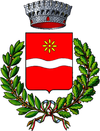Santa Margherita di Belice
| Santa Margherita di Belice | ||
|---|---|---|
| Comune | ||
| Comune di Santa Margherita di Belice | ||

Remains of the Mother Church (right) and the Palazzo Gattopardo
|
||
|
||
| Location of Santa Margherita di Belice in Italy | ||
| Coordinates: 37°41′N 13°1′E / 37.683°N 13.017°ECoordinates: 37°41′N 13°1′E / 37.683°N 13.017°E | ||
| Country | Italy | |
| Region | Sicily | |
| Province / Metropolitan city | Agrigento (AG) | |
| Government | ||
| • Mayor | Francesco Valenti | |
| Area | ||
| • Total | 67.28 km2 (25.98 sq mi) | |
| Elevation | 400 m (1,300 ft) | |
| Population (1 January 2014) | ||
| • Total | 6,455 | |
| • Density | 96/km2 (250/sq mi) | |
| Demonym(s) | Margheritesi | |
| Time zone | CET (UTC+1) | |
| • Summer (DST) | CEST (UTC+2) | |
| Postal code | 92018 | |
| Dialing code | 0925 | |
| Website | Official website | |
Santa Margherita di Belice (Sicilian: Santa Margarita) is a town in the Province of Agrigento in the Italian region of Sicily. It lies in southwest Sicily, 400 metres (1,300 ft) above sea level, near where the borders of the Province of Agrigento, Province of Trapani and Province of Palermo meet. It is approximately 60 kilometres (37 mi) southwest of the city of Palermo, 60 kilometres (37 mi) northwest of the city of Agrigento and sits in the Belice valley among the rivers Belice, Senore and Carboj.
In this territory there is evidence of settlements and remains of Sicanians, Greeks and Romans, and the town had once been a mountaintop stronghold of Berbers and later of Arab civilization. It is only thanks to them in this area who made the foundations of the hamlet "Casale of Manzil-Sindi" (named after their leader, Muhammed-ibi-as-Sindi).
Afterwards with the arrival of the Normans, the territory of Casale Manzil-Sindi was named "Misilindino" or "Misirindino", then it became part of the feudal estate of a Spanish nobleman, Baron Antonio de Corbera, responsible for the first built-up area in 1572. Only in 1610 King Filippo III, releasing the "licentia populandi", authorized Baron Girolano Corbera, Baron Antonio's nephew, to establish the new village, who named it Santa Margherita, with an ambitious architectural program, the most spectacular result of which was the Palazzo Filangeri-Cutò built around 1680. The princes Filangeri, who succeeded the barons Corbera, gave impetus to the village by construction of several buildings and increasing the population. Among Filangeri of Santa Margherita di Belìce are included three viceroys of Sicily: Alessandro I, Alessandro II e Nicolò I. In 1812 for about three months, Nicolo I hosted King Ferdinando, Queen Maria Carolina (the Donnafugata) and Prince Leopoldo di Borbone in the Palazzo of Santa Margherita.
...
Wikipedia


